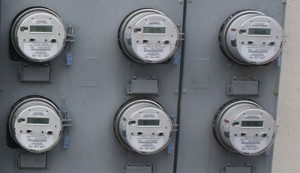
OCEAN CITY – Senior Public Affairs Manager for Delmarva Power (DP&L) Jim Smith updated the Mayor and Council this week on reliability improvements in Ocean City and the ongoing installation of smart meters.
According to Smith, a $26 million project aimed at improving transmission reliability at the 138th Street substation was completed on April 1. The project aims to maintain electric stability by eliminating voltage fluctuations during times of high demand or system disturbances. The investment’s primary goals were to maintain acceptable, stable voltage levels, control voltage swings during times of peak demand, especially in the summer, to control high voltages during times of light load, prevent voltage dips and collapses.
As of a result of a community outcry over the project, the Mayor and City Council set forth conditions for DP&L to move forward with the project. The conditions were within 60 days of the new infrastructure being energized, an initial electromagnetic field (EMF) and sound reading be conducted as well as twice a year in January and July. An independent specialist has verified that DP&L is currently in compliance with both the EMF and sound requirements outlined in the conditional use agreement. The results were submitted to the town and distributed to properties within 300 feet of the substation.
Other Ocean City transmission reliability improvement investments include the “Maridel to Ocean Bay” project that is a $10 million rebuild of 69 kilovolt (kV) transmission line between the Maridel substation on 41st Street and Ocean Bay substations on 85th Street to meet reliability criteria and meet electric load demands. There were 90 galvanized steel distribution/transmission poles installed that can withstand 120 mph winds. The project began October 2013 and was completed in April. According to Smith, this winter’s snow posed some challenges, but DP&L appreciates the patience of residents and visitors during the project, which exhibited a true partnership effort between the Town of Ocean City, Maryland State Highway Administration, Verizon, Comcast, C.W. Wright and DP&L.
Next up will be the “Worcester to Ocean City” rebuilding project that will cost $40-50 million to rebuild a nine-mile 138 kV transmission line between Berlin and Ocean City Substation at 2nd Street. An aerial portion in the Berlin/West Ocean City area will be completed between October 2014 and May 2015, and the submarine portion between West Ocean City and the Town of Ocean City will be completed between the fall of 2015 and spring of 2016. The project addresses system capacity, load growth and aging infrastructure as well as coordinating cable entrance into Ocean City with town’s public works department. A public meeting to address the project will be held this summer.
Also, underground cable replacement is an integral part of DP&L’s annual reliability enhancement program, according to Smith. A significant amount of underground cable has been replaced in Ocean City over the last five years and DP&L will continue to target aging infrastructure
According to Smith, the installation of smart meters in Ocean City is almost complete.
A smart meter is an electronic meter that allows two-way communications between a home or small business and DP&L. This metering technology is known as Advanced Metering Infrastructure (AMI), and smart meters are being installed throughout the Delmarva service territory to improve service to customers.
According to Smith, the benefits to smart meters for customers are fewer estimated bills, detailed energy use information for customers, daily and hourly use information available through “My Account” on the DP&L website, customer requested remote connects and disconnects, outage detection and ability to send a signal to ensure power restoration, remote reading reduces the number of vehicles and trucks that DP&L puts on the road, which in turn helps reduce carbon emissions, and enables new programs and price incentives to help customers save costs and reduce usage.
On Feb. 26, the Maryland Public Service Commission (PSC) issued its final order on an AMI opt-out provision for customers. All residential and small commercial customers who want to refuse installation of a smart meter will incur a one-time fee of $75, paid in three monthly installments and an ongoing, monthly charge of $17. These fees are based on the projected costs that each utility will incur for allowing customers to opt out.
Order 86200 reads, “Customers receiving a smart meter should not be burdened by the incremental costs associated with requiring the utilities to maintain two parallel and redundant infrastructures.”
The PSC directed DP&L to file actual costs incurred after the percentage of opt-out customers stabilizes estimated after 12 to 18 months, and the commission will then re-evaluate and may recalibrate the fees to be paid by opt-out customers.
According to Smith, about 1,500 customers have chosen to opt out so far in the Maryland service area out of 200,000.
